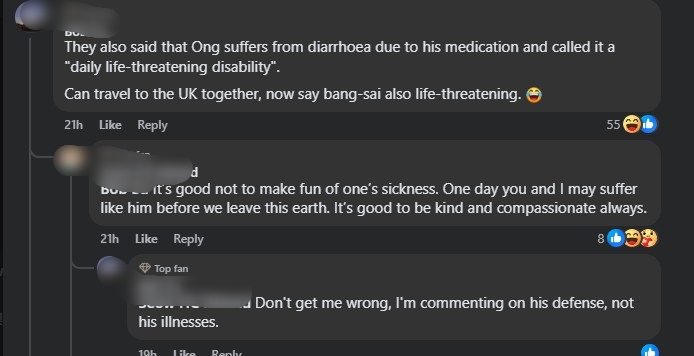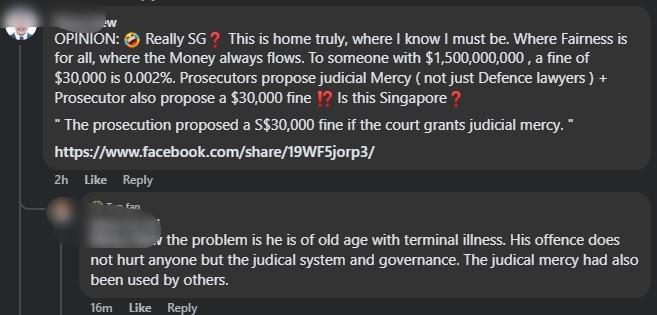The high-profile trial of property tycoon Ong Beng Seng entered a critical phase on 4 August 2025, drawing intense public and media attention.
The 79-year-old Malaysian pleaded guilty to an offence related to former Singapore transport minister S Iswaran.
Both the prosecution and defence urged the court to exercise judicial mercy, citing Ong’s severe medical condition.
Netizens responded with scepticism to Ong’s defence citing his health as a reason to avoid jail, particularly in light of his recent overseas travel while on bail.
They also scrutinised the prosecution’s decision not to oppose the call for judicial mercy.
Some sarcastically likened the situation to using a ‘Get out of Jail’ card from the Monopoly board game, drawing attention to how wealth appears to confer privileges—such as international travel, premium medical care, and top-tier legal representation—highlighting perceived disparities between the wealthy and ordinary citizens in the justice system.
Prosecution and defence agree on judicial mercy
Ong admitted to one count of abetting Iswaran in obstructing the course of justice by belatedly billing him S$5,700 (US$4,480) for a business class ticket from Doha to Singapore.
A second charge involving Iswaran receiving additional benefits—such as flights and hotel stays—was taken into consideration for sentencing.
According to investigations, the payment surfaced only months later, during a separate Corrupt Practices Investigation Bureau (CPIB) probe, when Iswaran’s name was found on a flight manifest.
Principal District Judge Lee Lit Cheng has reserved sentencing until 15 August.
Ong’s bail of S$800,000 remains unchanged after the defence’s successful request for an extension.
Much of the court’s proceedings focused on Ong’s medical condition.
His defence presented detailed submissions about his diagnosis of advanced multiple myeloma, an incurable cancer that affects plasma cells and weakens the skeletal and immune systems.
His lawyers noted that Ong suffers from further complications, including a high risk of gangrene and severe immunosuppression, which they argued would make prison life potentially fatal.
Deputy Chief Prosecutor Christopher Ong stated that a typical jail term would have been around eight weeks, derived from similar sentencing benchmarks.
However, due to what he described as the “severity and complexity” of Ong’s condition, the prosecution did not object to a non-custodial sentence and instead proposed the maximum applicable fine.
The defence cited medical experts, including a Harvard Medical School professor, who labelled Ong’s case one of the most complicated multiple myeloma cases they had encountered.
It was also revealed that Ong had undergone spinal surgery and now lives with a metal rod in his back, resulting in functional paralysis in both his hands and legs.
He also reportedly suffers from chronic diarrhoea due to medication, which the defence described as a “daily life-threatening disability”.
Judge questions overseas travel while defence cites private jet safeguards
Judge Lee questioned the apparent contradiction between Ong’s fragile health and his multiple overseas trips while on bail.
She pointed out that international travel exposes individuals to infection risks and physical hazards.
In response, lawyer Cavinder Bull explained that Ong had only travelled via private jet, minimising exposure to others.
He also argued that private travel created a more medically controlled environment, unlike prison conditions.
To further their argument, the defence cited three letters from the Singapore Prison Service (SPS), which described prison healthcare as “adequate” and “comparable” to public hospitals.
However, Bull asserted that such care could not match the specialist, round-the-clock attention Ong currently receives.
Public questions travel privileges amid health claims
Public sentiment has been notably critical.
On platforms like Facebook, many questioned how Ong could claim to be too ill for jail while having travelled to the United Kingdom, United States, and Europe between 28 April and 16 May.
He reportedly visited cities such as London, Boston, Miami, New York, Florence, and even Gibraltar.
Earlier in October 2024, he had travelled to London and Boston for medical reasons but also included business stops in Spain.
Online users expressed doubts over the fairness of allowing a billionaire to evade jail due to health reasons, while others less privileged might not even secure bail.


‘Get out of Jail Free’ card?
A comment sarcastically compared the defence’s argument to a ‘Get out of Jail Free’ card from the Monopoly board game.

Some posts speculated whether a wealthy defendant’s access to high-calibre legal representation and private healthcare creates an imbalance in the pursuit of justice.
On Mothership’s Facebook page, several comments mirrored Judge Lee’s scepticism, noting the inconsistency in Ong’s travel history and claims of medical fragility.
Others criticised the prosecution for not opposing the application for judicial mercy.

Mockery online over elite expectations of prison conditions
A comment on CNA’s page mockingly stated that the defence’s medical expert might expect prisons to resemble luxury resorts like the Four Seasons or Capella Hotel.

Some comments noted that common arguments—such as illness, mental health, or ageing—are often used in defence pleas, raising concerns about consistency in sentencing across socio-economic backgrounds.

Other netizens pointed out that prisons are equipped with medical facilities and doctors capable of treating inmates, arguing that age or illness should not excuse anyone from legal consequences.


However, a smaller segment of comments acknowledged that Ong’s age and terminal illness were valid considerations.
They argued that the court’s exercise of judicial mercy had precedent and does not necessarily compromise justice, particularly since no direct harm to individuals was caused.

Ong’s role in Singapore’s F1 history
Ong is a Malaysian national who has long been a prominent figure in Singapore’s business and sporting landscape.
He is widely credited with bringing Formula One to Singapore in 2008, making the country the first in the world to host an F1 night race.
Ong holds the rights to the Singapore Grand Prix and was instrumental in securing the event through direct negotiations with then-F1 chief executive Bernie Ecclestone.
During those negotiations, Iswaran served as the chairman of Singapore’s F1 steering committee and was the lead government negotiator.
The post ‘Monopoly card’ jibe as netizens question judicial mercy bid in Ong Beng Seng’s sentencing appeared first on The Online Citizen.


